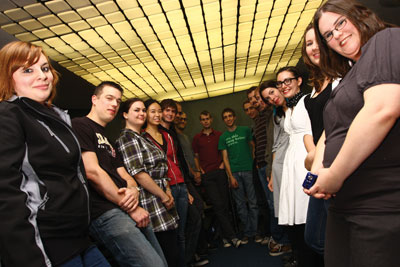 |
| Members of the Dalhousie Atheist Community. (Bruce Bottomley Photo) |
Derek Rodgers’ sense of wonder about things is palpable. The second-year biology student scrolls through his cell phone images to display photographs taken by the Hubble telescope. He enthusiastically talks about the enormity of space while pointing to the pictures of tiny lights containing galaxies upon galaxies.
“Science gives us a kind of perspective that is completely awe-inspiring,” he says.
He’s one of the founding members of the Dalhousie Atheist Community, now in its second year on campus. He helped establish the group because “there wasn’t a group for atheists, humanists, secularists—those people coming under the umbrella of free thinkers.” He wanted to provide a meeting place and a social environment for non-religious people to talk about the issues they are interested in. The community, which includes students from kinesiology, biology, Canadian studies and law, meets monthly and is hoping to have short talks by members and movie showings as part of the occasion. The group is also interested in community activism “where we feel the need to advocate around issues.”
The group opted for the word “atheist” instead of “free thinker” because it is unambiguous. “It’s difficult to organize non-believers,” says Mr. Rodgers, “it’s like herding cats. We are very different people. Our only commonality is non-belief. The closest thing to a common position is anti-dogmatism,” although all members place a high value on “empirically verifiable scientific data.”
He became involved in the Free Thought movement in high school. A formative moment came for him when a visiting Christian speaker addressing the school community made statements about evolution that he describes as “a stack of logical fallacies.”
“Being a science nerd... I thought, ‘there has to be a response to this’.” He prepared a rebuttal in which he invited like-minded students to join him in developing a Free Thought Society, apparently the first of its kind for a high school in North America.
“I call myself an atheist. I consider myself a skeptic,” says Mr. Rodgers. “A skeptic places a high value on evidence to be convinced of something. I haven’t heard convincing reasons why I should be a theist.”
He maintains that humanist values “emphasize the inherent moral worth of people” And argues that traditional monotheistic religions tend to denigrate human beings with concepts like original sin or over-emphasize the importance of humanity in the grand scheme of things.
“Science helps us to understand our place in the universe; it shatters the idea that humans are imbued with importance.”
“Religion is not a prerequisite to being a moral person” he adds, pointing out that the search for meaning is a question taken up by non-believers and believers alike. “The most profound questions we can ask are, ‘is there meaning in life?’ ‘What is our place?’ For free thinkers, the tools and methods of science are the best ways of knowing” the answers to these questions.
